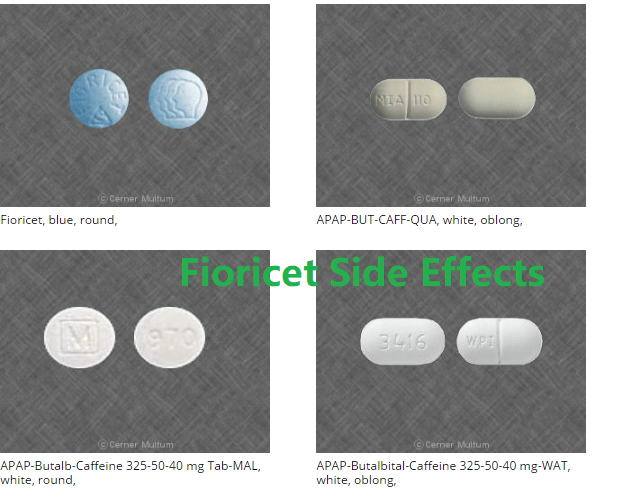Fioricet (butalbital, acetaminophen, and caffeine capsule) is a combination of a barbiturate, a non-salicylate analgesic and antipyretic, and a central nervous system stimulant indicated for the relief of the symptom complex of tension (or muscle contraction) headache.

Common side effects of Fioricet include:
- drowsiness
- lightheadedness
- dizziness, sedation
- shortness of breath
- nausea
- vomiting
- abdominal pain, and
- intoxicated feeling
The dose of Fioricet is one or two capsules every four hours. The total daily dosage of Fioricet should not exceed 6 capsules Fioricet may interact with monoamine oxidase (MAO) inhibitors, other narcotic analgesics, alcohol, general anesthetics, tranquilizers such as chlordiazepoxide, sedative-hypnotics, or other CNS depressants.
Tell your doctor all medications and supplements you use. During pregnancy, Fioricet should be taken only if prescribed. It is unknown if it would affect a fetus. All the drugs in Fioricet pass into breast milk, and breastfeeding while taking Fioricet is not recommended. Withdrawal symptoms may occur if you suddenly stop taking Fioricet.
Butalbital Drug Abuse And Dependence
Abuse And Dependee
Butalbital
Barbiturates may be habit-forming: Tolerance, psychological dependence, and physical dependence may occur especially following prolonged use of high doses of barbiturates. The average daily dose for the barbiturate addict is usually about 1500 mg.
As tolerance to barbiturates develops, the amount needed to maintain the same level of intoxication increases; tolerance to a fatal dosage, however, does not increase more than two-fold. As this occurs, the margin between an intoxication dosage and fatal dosage becomes smaller.
The lethal dose of a barbiturate is far less if alcohol is also ingested. Major withdrawal symptoms (convulsions and delirium) may occur within 16 hours and last up to 5 days after abrupt cessation of these drugs.
Intensity of withdrawal symptoms gradually declines over a period of approximately 15 days.
Treatment of barbiturate dependence consists of cautious and gradual withdrawal of the drug. Barbiturate-dependent patients can be withdrawn by using a number of different withdrawal regimens.
One method involves initiating treatment at the patient’s regular dosage level and gradually decreasing the daily dosage as tolerated by the patient.
The Fioricet ‘High’ and Abuse
The butalbital in Fioricet belongs to a class of drugs called barbiturates, a central nervous system depressant.
Like other barbiturates, it has the potential to cause physical and psychological dependence, which can lead to abuse.
Those who use too much Fioricet may report feeling so relaxed and stress-free that they seek out the drug as a way to get high.
Some describe it as feeling intoxicated. However, users can feel depressed and “crash” once the effects wear off.
